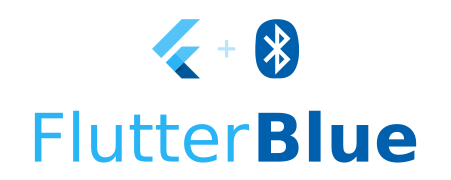flutter_blue_fork 0.8.3  flutter_blue_fork: ^0.8.3 copied to clipboard
flutter_blue_fork: ^0.8.3 copied to clipboard
Flutter plugin for connecting and communicating with Bluetooth Low Energy devices, on Android and iOS

Introduction #
FlutterBlue is a bluetooth plugin for Flutter, a new app SDK to help developers build modern multi-platform apps.
Alpha version #
This library is actively developed alongside production apps, and the API will evolve as we continue our way to version 1.0.
Please be fully prepared to deal with breaking changes. This package must be tested on a real device.
Having trouble adapting to the latest API? I'd love to hear your use-case, please contact me.
Cross-Platform Bluetooth LE #
FlutterBlue aims to offer the most from both platforms (iOS and Android).
Using the FlutterBlue instance, you can scan for and connect to nearby devices (BluetoothDevice). Once connected to a device, the BluetoothDevice object can discover services (BluetoothService), characteristics (BluetoothCharacteristic), and descriptors (BluetoothDescriptor). The BluetoothDevice object is then used to directly interact with characteristics and descriptors.
Usage #
Obtain an instance #
FlutterBlue flutterBlue = FlutterBlue.instance;
Scan for devices #
// Start scanning
flutterBlue.startScan(timeout: Duration(seconds: 4));
// Listen to scan results
var subscription = flutterBlue.scanResults.listen((results) {
// do something with scan results
for (ScanResult r in results) {
print('${r.device.name} found! rssi: ${r.rssi}');
}
});
// Stop scanning
flutterBlue.stopScan();
Connect to a device #
// Connect to the device
await device.connect();
// Disconnect from device
device.disconnect();
Discover services #
List<BluetoothService> services = await device.discoverServices();
services.forEach((service) {
// do something with service
});
Read and write characteristics #
// Reads all characteristics
var characteristics = service.characteristics;
for(BluetoothCharacteristic c in characteristics) {
List<int> value = await c.read();
print(value);
}
// Writes to a characteristic
await c.write([0x12, 0x34])
Read and write descriptors #
// Reads all descriptors
var descriptors = characteristic.descriptors;
for(BluetoothDescriptor d in descriptors) {
List<int> value = await d.read();
print(value);
}
// Writes to a descriptor
await d.write([0x12, 0x34])
Set notifications and listen to changes #
await characteristic.setNotifyValue(true);
characteristic.value.listen((value) {
// do something with new value
});
Read the MTU and request larger size #
final mtu = await device.mtu.first;
await device.requestMtu(512);
Note that iOS will not allow requests of MTU size, and will always try to negotiate the highest possible MTU (iOS supports up to MTU size 185)
Getting Started #
Change the minSdkVersion for Android #
Flutter_blue is compatible only from version 19 of Android SDK so you should change this in android/app/build.gradle:
Android {
defaultConfig {
minSdkVersion: 19
Add permissions for Bluetooth #
We need to add the permission to use Bluetooth and access location:
Android
In the android/app/src/main/AndroidManifest.xml let’s add:
<uses-permission android:name="android.permission.BLUETOOTH" />
<uses-permission android:name="android.permission.BLUETOOTH_ADMIN" />
<uses-permission android:name="android.permission.ACCESS_COARSE_LOCATION"/>
<application
IOS
In the ios/Runner/Info.plist let’s add:
<dict>
<key>NSBluetoothAlwaysUsageDescription</key>
<string>Need BLE permission</string>
<key>NSBluetoothPeripheralUsageDescription</key>
<string>Need BLE permission</string>
<key>NSLocationAlwaysAndWhenInUseUsageDescription</key>
<string>Need Location permission</string>
<key>NSLocationAlwaysUsageDescription</key>
<string>Need Location permission</string>
<key>NSLocationWhenInUseUsageDescription</key>
<string>Need Location permission</string>
For location permissions on iOS see more at: https://developer.apple.com/documentation/corelocation/requesting_authorization_for_location_services
Reference #
FlutterBlue API #
| Android | iOS | Description | |
|---|---|---|---|
| scan | ✅ | ✅ | Starts a scan for Bluetooth Low Energy devices. |
| state | ✅ | ✅ | Stream of state changes for the Bluetooth Adapter. |
| isAvailable | ✅ | ✅ | Checks whether the device supports Bluetooth. |
| isOn | ✅ | ✅ | Checks if Bluetooth functionality is turned on. |
BluetoothDevice API #
| Android | iOS | Description | |
|---|---|---|---|
| connect | ✅ | ✅ | Establishes a connection to the device. |
| disconnect | ✅ | ✅ | Cancels an active or pending connection to the device. |
| discoverServices | ✅ | ✅ | Discovers services offered by the remote device as well as their characteristics and descriptors. |
| services | ✅ | ✅ | Gets a list of services. Requires that discoverServices() has completed. |
| state | ✅ | ✅ | Stream of state changes for the Bluetooth Device. |
| mtu | ✅ | ✅ | Stream of mtu size changes. |
| requestMtu | ✅ | Request to change the MTU for the device. |
BluetoothCharacteristic API #
| Android | iOS | Description | |
|---|---|---|---|
| read | ✅ | ✅ | Retrieves the value of the characteristic. |
| write | ✅ | ✅ | Writes the value of the characteristic. |
| setNotifyValue | ✅ | ✅ | Sets notifications or indications on the characteristic. |
| value | ✅ | ✅ | Stream of characteristic's value when changed. |
BluetoothDescriptor API #
| Android | iOS | Description | |
|---|---|---|---|
| read | ✅ | ✅ | Retrieves the value of the descriptor. |
| write | ✅ | ✅ | Writes the value of the descriptor. |
Troubleshooting #
When I scan using a service UUID filter, it doesn't find any devices. #
Make sure the device is advertising which service UUID's it supports. This is found in the advertisement packet as UUID 16 bit complete list or UUID 128 bit complete list.

